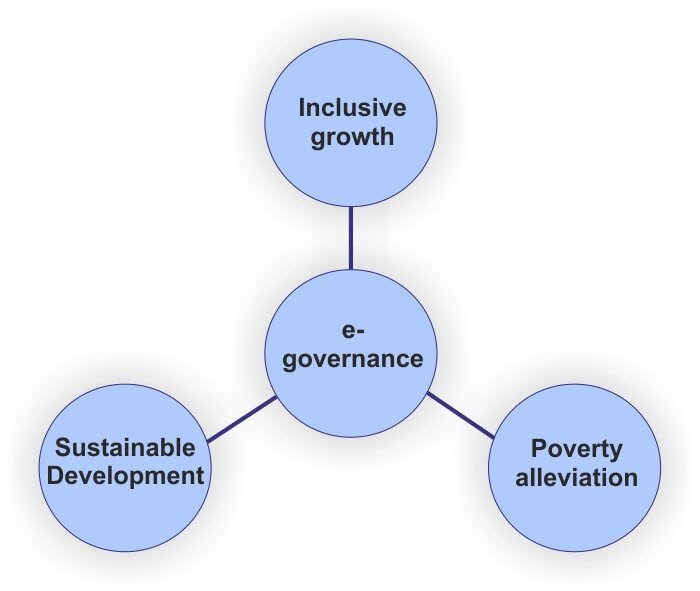-
10 Nov 2020
GS Paper 2
Polity & Governance
“Information and communication technologies (ICTs) provide new opportunities and new challenges for developing economies.” Discuss the role of ICTs in achieving economic inclusion and bringing social transformation. (250 words).
- Introduce by defining and linking ICT, e-Governance and inclusive growth.
- Discuss the merits of ICTs and e-initiatives with socio-economic dimensions.
- Describe the new emerging challenges of the ICT sector.
- Conclude by mentioning the need for citizen-centric governance.
Introduction
- E-Governance is the application of Information and Communication Technology (ICT) to the processes of government functioning in order to bring about ‘Simple, Moral, Accountable, Responsive and Transparent’ (SMART) governance.
- This SMART governance model should lead to inclusive growth that creates opportunity for all segments of population and distributes the dividends of increased prosperity fairly across society. Thus, e-Governance helps in socio-economic development and sustainable growth for all.
Body
Following are the applications of e-governance which illustrate economic inclusiveness in bringing social transformation in Indian society:
Economic dimensions
- Reviving agriculture sector:
- Digitization of land records via Bhoomi Rashi portal.
- Geographic Information Systems (GIS) has helped improve productivity, and empowered farmers by using sustainable, economical and eco-friendly technology.
- Financial literacy and inclusion:
- PMGDISHA (Pradhan Mantri Gramin Digital Saksharta Abhiyan) to make at least one person per family digitally literate.
- Aadhaar Enabled Payment System (AEPS) facilitates banking services and digital payment.
- Digital payment: Many innovative digital payment tools, namely BHIM-UPI, Bharat QR Code, National Electronic Toll Collections, etc, have been implemented.
- Quality employment:
- UMANG mobile application for availing government services through backend integration with several government application and databases.
- Digitization of EPFO records : access to view one’s pension amounts and deposits, people feel more assured that their funds are safe and can monitor their fund status.
Social dimensions
- Affordable education:
- National Scholarship Portal as a single online platform integrating multiple scholarship schemes to facilitate application submission, verification and disbursal of funds through Direct Benefit Transfer (DBT).
- SWAYAM – a massive online open courses (MOOCs) platform which offers more than 2000 programmes.
- ‘National Knowledge Network (NKN) to interconnect all institutions of higher learning and research with a high speed data communication network to facilitate knowledge sharing and collaborative research.
- Quality Healthcare:
- e-Hospital : facilitates automation in hospitals through 20+ modules of Hospital Management Information System namely patient registration, IPD, pharmacy, blood bank, etc.
- 'Mera Aspataal’ Application : Allows patients to provide feedback on service quality at hospitals and ultimately help establish a patient driven, responsive and accountable healthcare system.
- Inclusion of marginalized sections:
- Non-visual display access (NVDA), an open source screen reading software, available in 7 Indian languages facilitates the differently abled to access services.
- Jeevan Pramaan facilitates pensioners to submit their life certificate digitally from anywhere, anytime basis.
- Facilitating participatory governance/ Resolving citizens grievances:
- MyGov portal facilitates participatory governance by providing a common digital platform, where citizens can share their views on government programmes and schemes.
- Real Time Governance initiative of Andhra Pradesh government to resolve citizen grievances and monitor infrastructure projects, incidents and weather & climatic events across the state in real time, leveraging technology services.
Thus, e-governance can facilitate economic inclusiveness and bring social transformation in India.
Emerging Challenges for ICT sectors
- Cybersecurity: The cybersecurity challenge is two-fold: Cyberattacks are growing in size and sophistication; Millions of cybersecurity jobs remain unfilled. Not only there aren’t enough IT professionals with cybersecurity expertise, but also there are huge cybersecurity skills gaps. It’s also identified as the most challenging hiring area in IT.
- Decline in Spending: Future challenges for IT and outsourcing companies stems from a decline in spending on IT projects by companies around the world, especially in such sectors as travel and tourism, hospitality, and aviation, which have lost 80 percent to 90 percent of their revenues. Less-troubled sectors, such as banks and financial services firms, are in cash-conservation mode and looking to delay new IT projects.
- Work-from-Home Issues: IT services and outsourcing companies in India struggled to shift their workforce to a remote-work setting following the nationwide lockdown. Companies scrambled to provide computers to hundreds of thousands of employees; overcome low Internet bandwidth; and get permission from clients to allow working from home, which was earlier barred due to security concerns.
- Analytics and data management: Aside from cybersecurity and cloud computing, this is the biggest skill gap area for IT departments. Organizations are struggling to manage a wealth of new data. By 2025, It is estimated the world will create and replicate 163 zettabytes (ZB) of data, 10 times the number that was created in 2016. New data is constantly accumulating, creating a host of storage and security risks that must be addressed.
Conclusion
Digital India programme helped India harness digital technologies to bring about a positive change towards good governance. The aim of any e-Governance initiative should be to ensure citizen participation and empowerment with the technology that is transformative, affordable and sustainable. Thus, digital empowerment is necessary to achieve the motto of ‘Maximum Governance, Minimum Government’.






-min.jpg)